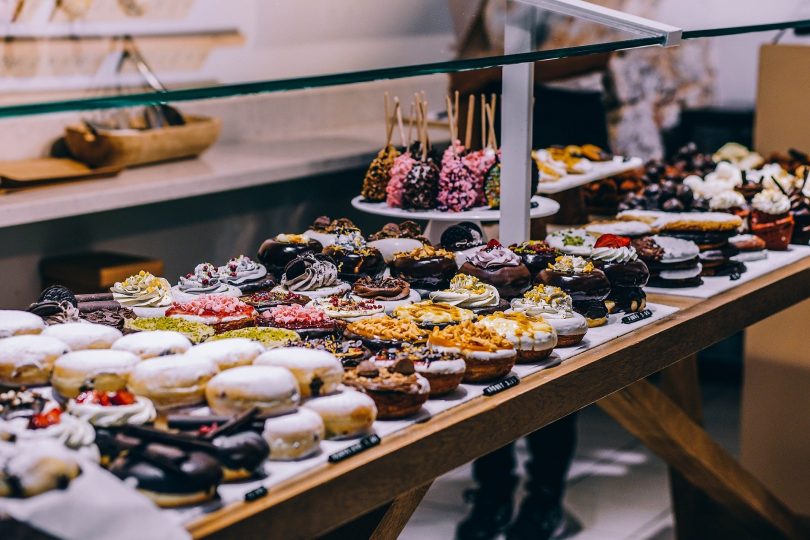By Katharine Swindells
BU News Service
“The Great British Bake Off” is having its comeback year. Critics attribute its boost in viewing numbers, after a couple of years of steady decline, to people’s desire for comfort met by the show’s cozy escapism.
But perhaps the ratings spike owes more to people being stuck at home, not to the quality of the show. This year has confirmed what has been true for a while now: the production company should have wised up and killed Bake Off before it killed itself.
Now the inevitable has happened: This show’s soggy bottom has finally fallen out from under it.
“Bake Off” faced the same tough choice all reality television shows had to make this year of whether or not to address the obvious. The twelve contestants, the hosts, the judges and the production team members all “bubbled” together in a hotel for the six weeks of filming. Usually, the contestants would return home to their jobs and families each week between the rounds.
Unfortunately, although the show is supposed to be escapism, they simply can’t escape the grim truth of 2020. When the contestants mention that they haven’t seen their families in weeks, we are quickly and awfully reminded that, oh yes, we are in the middle of a global health crisis. Dave talks fondly of his girlfriend as he shapes her pregnant belly onto a small marzipan figure. Are we supposed to be happy that he ditched his heavily pregnant partner in the middle of a pandemic?
The interludes of footage of the contestants and their families are obviously pre-recorded, which means it fits awkwardly into the narrative of the episodes. A clip of contestant Lottie waving up at her beloved grandparents from the street below isn’t sweet; it’s thoroughly depressing. The show can’t really be blamed for not knowing how to handle the pandemic, but the weird limbo only highlights the deep cracks in the series forming for years.
The contestants are endearing as always, but it’s the judges and hosts that make the tone of the show, and these four are doing it no favors. Paul Hollywood’s sickening pseudo-masculine posturing is as disgusting as ever, and Prue Leith’s prissy calorie-shaming is tiresome.
Even in his fourth season on the show, Noel Fielding still feels wildly out of place, as though he’s even more confused that he’s there than we are. His increasingly manufactured jokes with new co-host Matt Lucas only emphasize the lack of natural chemistry between them. And it is impossible to watch Lucas bumbling around the tent, putting on a repulsively childish façade, without fixating on the fact that he built his entire career on blackface, ableism and the lowest, most offensive kind of humor.
But, whether it can be attributed to Lucas or not, there is a subtle but distinct edge to “Bake Off” this year, almost an edge of nastiness. “Bake Off” has always been about sweetness, about the way the contestants love and support each other. Original hosts Mel and Sue would very lightly tease the contestants, always with the understanding that they wanted them to succeed. That’s what made “Bake Off” different than other reality television, and one of the reasons it found such popularity in the States.
And yet this season, Lucas pokes fun at music teacher Rowan’s waistcoat-themed biscuits, calling him posh, which seems a rather unfair statement from the comedian whose high school cost twenty-grand a year. In bread week, Fielding jokes about Lottie’s frantic anxiety, because how dare she be invested in a show that could redefine her entire career? The two hosts “jokingly” call out wrong times mid-contest, sending the bakers into a panic as they believe they only have a few minutes left to construct their showstoppers.
The unspoken agreement of “Bake Off” has always been that we, the viewers, take the competition as seriously as the contestants. We shout at the screen as the bakers misunderstand the technical directions, grip the edges of our seat as we wait to see whether dough has risen. But this season there seems to be an air of snide mockery from Fielding and Lucas, as though looking at us, the audience, to say, “This is all a bit silly isn’t it?”
In breaking that unspoken pact, the two violate the very core of the show.
But it’s not just that the show has shifted since it first began; the world has shifted too. In 2010, Britain was a very different place, and “Bake Off”’s twee liberalism is a relic of that pre-Brexit, pre-decade of crippling austerity, world. This show reflected what a lot of society believed that systemic racism could be solved with gestures of diversity and inclusivity, and we saw this in “Bake Off”’s contestants and their work.
Bake Off was about expanding what it means to be “Great British,” one turmeric scone with chili-mango jam at a time. But if the past decade has taught us anything, it’s that we can’t just gloss thick icing over Britain’s legacy, ignoring the rotten ingredients it was made from. “Bake Off” only proves that we can’t bury our heads in the flour; we need to leave the tent and face reality.





